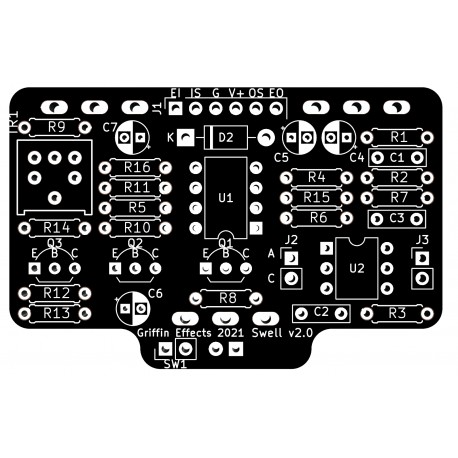FX15 Swell PCB
Reference: FX15PCB1
Compare to the DOD™ FX15 Swell

In Stock
The FX15 Swell project is based directly off the DOD FX15 Swell. A pedal similar to the Boss SG-1 Slow Gear except the FX15 requires you to hold down the "bypass" switch to activate the swell which alone makes this work better than the SG-1 because it doesn't have to detect the onset of a note to create the swell. The instructions will also include a mod to create a detection method that includes using a metal pick!
The original used a CLM50 which is hard to find and expensive if you do. We replace this with a standard LED/LDR combo and it works excellent but
the board includes pads for both the CLM50 and a LED/LDR.
The FX15 Swell Pedal was introduced in late 1984, and was designed to help guitar players approximate backwards guitar sounds (where a note's amplitude swells rather than decays) in real time. DOD's circuit used a minimum of parts and appeared to be utterly unique compared to the Boss SG-1 Slow Gear. However, like the Boss SG-1, the DOD FX15 was a slow seller (partially due to its somewhat counterintuitive design -- see below), and it appears to have been discontinued by late 1986.
Controls (with descriptions from the manual):
Decay (0.7-2 s) - "controls the time for the signal to return to normal when the switch is released"
Attack (20 ms to 1 s) - "controls the time for cut/boost to occur when the switch is pressed"
Cut/Boost (-37 dB to +14 dB) - "when the switch is pressed there will be a cut in signal if rotated counter clock wise from center, a boost if clock wise from center"
Input impedance: 500 k Ohms
Output impedance: 1 k Ohms
PCB: Manufactured
PCB Dimensions: 2 x 1.94 inches (51 x 49mm)
Instructions updated 3.20.2015
Buy a kit at Musikding: FX15 Swell Kit
Build Reports:
9.15.2015 by Tony VIEW
Got this for christmas. Worked right when I powered it up and it worked great. I also got the photoresistor from them.



